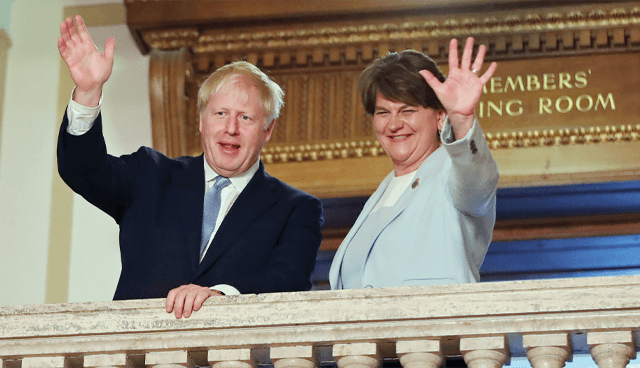Mapping a hard border and the Good Friday Agreement

Claims by Prime Minister Boris Johnson that he is committed to the Good Friday Agreement appear at odds with his failure to compromise on a deal with the EU. A recent UK Government scoping exercise highlights that as the UK heads towards a no deal exit on 31 October and an inevitable hardening of the border, 96 out of 142 areas of North-South cooperation are underpinned by the Good Friday Agreement or existing EU legal and policy frameworks.
“Junk the backstop”, was the call of then Prime Minister-in-waiting Boris Johnson when he attended the DUP’s conference in Belfast in late 2018. The backstop, the security measure worked into the withdrawal agreement to align Northern Ireland’s customs and regulations with that of the EU, in the event of a no deal Brexit, is the fail safe for the prevention of a hard border in Ireland.
With North-South co-operation now an ingrained element of the island’s economy and society, many elements of the Good Friday Agreement are underpinned by the continuation of this co-operation and a hard border is recognised as a notable undermining of the deal signed in 1998.
“Both the UK and Ireland will have an obligation to honour the Good Friday Agreement, protect the peace process and honour our commitment to the people of Ireland and Northern Ireland, that there won’t be a hard border,” Taoiseach Leo Vardkar has previously said.
Despite this, Prime Minister Johnson remains on course to deliver a no deal Brexit and ultimately a hard border. In a recent letter to the EU, 10 weeks out from Brexit, he argues that the backstop was “anti-democratic and inconsistent with the sovereignty of the UK”, adding his belief that the backstop risked “weakening the delicate balance embodied in the Belfast Agreement”.
Johnson’s position is supported by DUP leader Arlene Foster, who has reiterated that it is “very important” for the UK to leave the EU by 31 October, despite the threat of a hard border a no deal exit could impose. Foster, the leader of Northern Ireland’s largest political party, a region of the UK that had a majority vote to remain in the EU, has previously said that the Good Friday Agreement is not sacrosanct.
Speaking recently after Johnson’s letter to the EU was sent, Foster confirmed her support for Johnson’s approach stating that the backstop was “anti-democratic”, “inconsistent with the sovereignty of the United Kingdom” and “risks weakening the delicate balance between the parties of the Belfast Agreement”.
Foster said that the Agreement has been used to justify the backstop but argues that it doesn’t have the support of “political unionism”. “When you look across unionism, we are all against the backstop,” she states. “That should concern the Dublin Government because if it is genuine and values the Belfast Agreement they should be very concerned that unionism does not support the backstop.”
In response, President of the European Council, Donald Tusk, said: “The backstop is an insurance to avoid a hard border on the island of Ireland unless and until an alternative is found. Those against the backstop and not proposing realistic alternatives in fact support re-establishing a border. Even if they do not admit it.”
When you look across unionism, we are all against the backstop.
— Arlene Foster
Areas of North-South co-operation directly underpinned by or linked to the Good Friday Agreement or existing EU legal and policy basis, according to the UK’s scoping exercise, include cross-border implementation bodies such as the Special EU Programmes Body, InterTradeIreland and the Food Safety Promotion Board.
Priority North South Ministerial Council areas such as that of education, tourism, health, transport, environment and agriculture are also affected.
Health
In health, areas identified as by the scoping document refer to the North West Cancer Centre, the All-Island Congenital Heart Disease Network, child protection and major emergencies and A&E planning cooperation, all of which are underpinned by the current status quo. A change to the border and any undermining of the Good Friday Agreement would inevitably cause disruption to these services.
Transport
Commercial vehicle roadworthiness enforcement and concerted checkpoints and vehicle and driver safety checks are both directly underpinned by or linked to the Good Friday Agreement, as is the cross-border Enterprise Rail Service. The road network itself also has a partial link under the Agreement.
Environment
In environment, the scoping document identifies direct underpinning or link by the Good Friday Agreement in areas such as water quality, water pollution and water catchment work, as well as environmental protection reporting and research.
Agriculture
The NSMC’s work on CAP discussion, as part of its priority work on agriculture, given that many policy choices and implementation issues faced by Northern Ireland and Ireland are the same, means that it is directly underpinned by or linked by the Good Friday Agreement, as is co-operation on checks on third country products of animal origin, animal health and welfare working groups and steering group and the North South Working Group on veterinary medicines.
Areas of co-operation beyond the North South Ministerial Council directly underpinned by or linked to the Good Friday Agreement or existing EU legal and policy frameworks include the likes of energy, policing and justice.
The scoping document created by the UK specifically outlines areas whereby the Good Friday Agreement underpins the avoidance of a hard border. Those areas that are directly linked include the likes of customs, VAT, data sharing and operational cooperation on customs matters, checks on live animals and the movement of medicines, devices and other healthcare goods.





